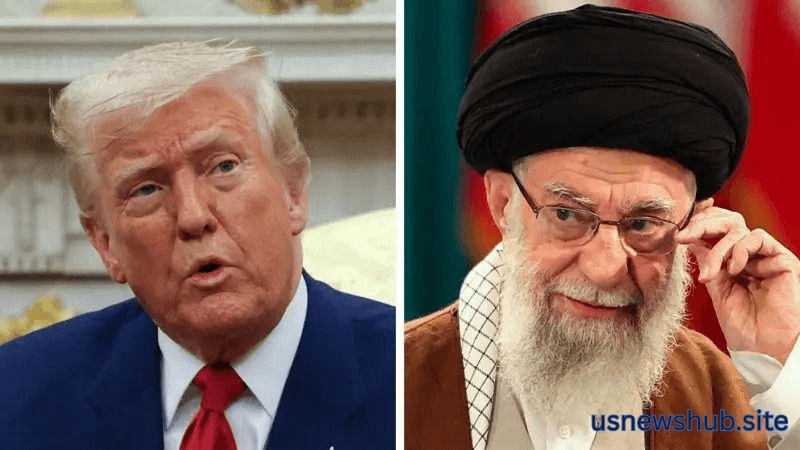Ex-President Trump assesses U.S. options amidst intensifying Israel-Iran war. Fatal aerial bombardment persists as Iran threatens, “The battle begins.” U.S. forces on standby. Read what Iran communicated to the U.S. and the reasons why this war started.
Conflict Summary: Day 6 of Israel-Iran War
With the Israel-Iran war in its sixth straight day, violence in the Middle East continues to escalate. The war has been greeted with public commentary from former President Donald Trump, calling for a “strong but measured American response” as tensions are on the brink of escalating into a regional war.
⚠️ What Caused the Israel-Iran War?
The ongoing hostilities were precipitated by a fatal Israeli airstrike in Syria that assassinated a senior Iranian military commander. Iran responded with missile bombardments and drone strikes against Israeli military installations, leading Israel to step up its attacks on Iranian interests in Syria and Lebanon.
Both countries are now in all-out escalation, with regional militias entering the mix.
Trump’s Stand: Warning or War?
Former President Trump, in a Florida press briefing, condemned the Biden administration as one of “strategic weakness,” calling for a more assertive military stance to support Israel.
“The U.S. needs to stand with our closest ally in the Middle East. This is a leadership test.” — Donald Trump
He also threatened that if he were president, the U.S. would be sending naval and air forces to check Iran’s ambitions.
Iran’s Warning to the U.S.: “Stay Out or Face Consequences”
Iran’s Supreme Leader Ayatollah Ali Khamenei issued a fiery warning to the United States:
“The battle has begun. If the U.S. intervenes directly, we will respond decisively across all fronts.”
This threat came in response to heightened U.S. military deployments in the Mediterranean region, including aircraft carriers and strategic bombers now based in Qatar and Kuwait.
Iran accused Washington of facilitating Israeli aggression and stated that any U.S. bases in the region would be “legitimate targets.”
⚔️ U.S. Troops on Standby: Pentagon Deploys
To counter increasing threats, the Pentagon has deployed rapid-response units, such as Marines and special operations troops, near Israel. Dozens of F-35 fighter jets and Patriot missile defense systems have been redeployed to defend U.S. interests and allies in the area.
The USS Eisenhower carrier strike group is now in range of Iranian targets.
Regional and Global Consequences
- Oil prices surged above $100 per barrel on concerns of a wider Middle Eastern war.
- Iran and Lebanon’s Hezbollah, as well as Iraqi militias, have warned to launch new fronts against Israel.
- The U.N. Security Council convened in an emergency session, but no coordinated action resulted.
FAQs: What You Need to Know
Q. Why are Israel and Iran at war?
Iran and Israel have always been regional adversaries. The war currently ongoing broke out after Israel attacked an Iranian military base in Syria, triggering backlashing attacks. Iran sponsors proxy organizations such as Hezbollah and Hamas, which are perceived by Israel as existential threats.
Q.What did Iran tell the U.S.?
Iran threatened the U.S. to keep out of the war, or to be directly attacked on its military installations throughout the Middle East. The Supreme Leader announced, “The battle has started,” indicating Iran’s preparation for multi-front war if the U.S. gets involved.
Q. Will the U.S. join the war?
To date, the U.S. has not entered the war officially but has placed military resources in position to protect its interests in the region. Trump and most Republicans support greater backing for Israel, whereas the Biden administration is looking for diplomatic solutions to ease tensions.
Q. What happens if the war escalates?
If the war escalates:
Hezbollah can attack from Lebanon
Yemen’s Houthis can attack Saudi Arabia or Israel
Global oil trade corridors such as the Strait of Hormuz can be disrupted
This might cause economic instability, refugee emergencies, and international security issues.
What’s Next?
As Israel bristles on high alert, Iran menaces U.S. retaliation, and Trump calls for military action, the Middle East is at one of its most perilous flash points in decades. Diplomacy or escalation is up to what comes next from Washington, Tehran, and Tel Aviv.
Last Words
As war drums grow louder, American leadership and global diplomacy are being put to the test. While Iran threatens to escalate and Trump urges bold action, how things unfold could determine not only regional politics—but world peace



